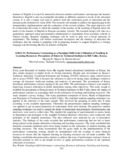Performance Contracting as a Paradigm Shift in the Utilization of Teaching & Learning Resources: Perceptions of Tutors in Technical Institutes in Rift Valley, Kenya.
Abstract
Every year thousands of students leave the regular formal educational institutions in Kenya, but
they cannot progress to higher levels of formal education. Despite past investments in Kenya’s
Technical, Industrial, Vocational Education and Training (TIVET) subsector, many school leavers
fail to access TIVET. This is because the subsector is said to be facing many challenges related to
wastage of resources, irrelevant training and turnover of personnel. The government of Kenya
introduced performance contract signing in the year 2004. The performance contracts were aimed at
improving resource utilization in public institutions among other objectives. This study sought to
establish the perceptions of Kenyan tutors in Technical Institutes in Rift Valley about the impact of
performance contracts as a paradigm shift on the utilization of teaching and learning resources. The
study adopted a survey strategy. The study population comprised of tutors, Heads of Department
and Principals of Technical Institutes in Rift Valley. The stratified random sampling technique was
applied in the selection of the study sample. This involved the grouping of tutors into 8 strata
according to the available departments. Thereafter the proportionate random sampling technique
was applied to get an equal proportion of respondents from each stratum. The purposive random
sampling technique was used to sample the heads of department and principals. Questionnaires and
interviews were used to collect data. This entailed the supplying of quest ionnaires to tutors, heads
of department and principals of the sampled Technical Institutes. Interviews were conducted with
principals of the sampled institutions. The data collected were analyzed by use of descriptive
statistics. The findings of the study revealed that performance contracting had not led to tutors
being trained on the proper utilization of learning and teaching resources. The study concluded that
financial constraints hindered tutors from being trained on the utilization of modern learning and
teaching resources. The study recommends that the gains made in the implementation of the
performance contracting strategy should be strengthened with the availing of more financial
resources to ensure that the required learning & teaching resources are all made available. The
findings would help education policy makers to address the issue of performance contracts from an
informed position as well as get insight on how to apply performance contracts in the optimum
utilization of resources.
Collections
- Master of Education [29]

